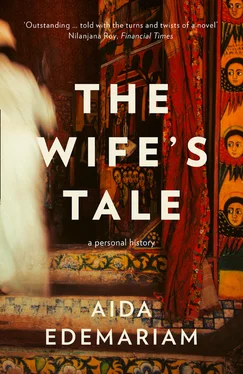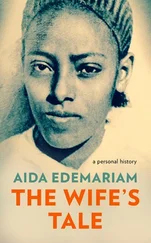Mariam Mariam Mariam Mariam Mariam, dirèshilin.
O Lady Lady Lady Lady Lady, come to our aid.
‘AND BEHOLD IT CAME TO PASS ONE DAY WHEN THE PEOPLE WERE JOURNEYING ALONG THE ROAD TO COME TO THAT CHURCH, THAT A MIGHTY ROARING RUSH OF WATERS CAME FROM THE SEA, AND IT BURST UPON THE PEOPLE AND ALARMED AND TERRIFIED THEM EXCEEDINGLY, AND DROVE THEM OUT OF THEIR SENSES; AND THE WATER SURROUNDED THAT PLACE AND ROSE TO THE HEIGHT OF ABOUT TWO MEASURES, AND THE PEOPLE WERE WELLNIGH DROWNED.’
And with a great tearing and an onrush of fluid, the baby arrived, pouring into the arms of the midwife at her feet. She fell back and they caught her and laid her down to rest.
When the placenta had safely followed they took a pat of butter and rubbed the newborn’s head. They pinched its nose, smoothing it, pulling at it, so it would grow long and narrow. And their ililta rose, loud and joyous.
Nine times. A messenger was dispatched to Addis Ababa, to tell Aleqa Tsega his first child was a girl, and that she was named Alemitu.
In her father’s village the feasting began. Araqi and tella flowed like water. Injera arrived by the mesob. Five sheep were slaughtered, and then someone brought four more. All who attended the birth and fasted for the duration ate their fill. But the new mother took nothing at all. They gave her honey, and buttered oatmeal gruel, but she would not touch it. She lay curled on the floor, hugging herself, trying to sleep.
It was only when, decades later, she herself beat through the streets of Addis Ababa in supplication that she began to get an inkling of where her husband had been when Alemitu was born: under a colder sky, walking raw avenues that criss-crossed the bottom of a green bowl surrounded by mountains. The city had been capital for only forty years, and they were still building it. Donkeys trotted through the main streets as they would in any town in the country, carrying firewood, dried discs of cow-dung, baskets for market, but here they also hauled scaffolding, sheets of corrugated iron, drew telegraph poles rattle-bouncing through the dust. Everywhere a new structure was going up, a road being metalled, cable installed, or a ragged work gang being whipped into a semblance of efficiency. Rumours eddied through the thoroughfares: that Tafari was overseeing every detail of the preparations himself; that every day he appeared, a small long-nosed black-caped figure, at a hotel, or the market, or the telegraph office or on the wide sweep of road leading from the railway station, checking on the quality of asphalt or of uniform or of welcome; on the impression his city would make on the foreign guests who had already begun to arrive.
As the coronation neared, the donkeys were joined by horses and mules, trotting footsore in from all across the empire. They carried warriors and their generals; lords of the north, the south, the east and the west, princes who owned more land than the regent, who commanded armies as big as or bigger than his. Princes and priests, priests and more priests, from Aksum and Debrè Libanos and Meqellé, from Sidamo and Harar and Debrè Marqos, or, like her husband, from Gondar, priests in white turbans, black capes, long self-regarding beards; monks and nuns in turmeric yellow, gold-red amber necklaces hanging heavy on breastbones. Prayer sticks and crosses everywhere, crosses of gold and silver, of brass and of humble wood. And Tsega moved proud amongst them, listening to them jostle over the niceties of hierarchy and opportunity afforded by Tafari’s achievement the previous year, of finally beginning to bring independence to their sixteen-hundred-year-old church.
Over sixteen hundred years since a ship on the Red Sea coast was attacked, leaving two Christian boys from the Phoenician city of Tyre to find their way to the Aksumite court where they became companions of Ezana, the emperor’s son. Sixteen hundred years since one of the brothers, Frumentius, now grown, travelled to Alexandria to tell the leadership of the Egyptian church that Christian merchants from across the Roman empire congregated in Aksum and needed a bishop. Frumentius himself seemed best qualified for the job so they consecrated him and dispatched him back to Aksum, where he converted his childhood friend (who, now emperor, well understood the usefulness of such ties with Rome, his chief market for ivory, tortoiseshell, gold, rhinoceros horn). The Ethiopian church had been led, in name at least, by an Egyptian monk ever since, but when Empress Zewditu promoted Ras Tafari to negus, or king, of Gondar, he had moved at once to free it. Assiduous diplomacy produced, within a year, a promising first step – division of the empire into dioceses led by five Ethiopian bishops, among them Abunè Abraham of Gojjam and Begemdir.
Eventually, seven days before the coronation, the milling priests resolved into an expectant phalanx. Serried rows of eyes, her husband’s among them, watched as an honour guard marched through the gates of St George’s Cathedral and up the steps. Rows of eyes watched the reverent handing over of robes, of a sceptre and an orb, of gold rings and spears, of a sword sheathed in gold and diamonds, of a gold-encrusted Bible and two heavy gold crowns. Then, for seven days and seven nights, seven times seven priests sang David’s psalms and the Book of the Praise of Mary, cycling again and again through all their strophes of light.
The words, of course, were familiar to all the men, who had each spent decades studying their order and their intent; so familiar they were all too often muttered and gabbled, boredom taking precedence, minds drifting to other things; but when, in the dark hours after midnight on the seventh day, Negus Tafari and his wife arrived at the cathedral to begin their vigil, it was as though the phrases had been renewed, charged with present meaning. Also that of the past: this coronation drew much of its power from the Kibrè Negest, the Book of the Glory of Kings, in which, as all here knew, it was told how Solomon of Israel was visited in Jerusalem by Makda, queen of Sheba. Solomon, who would eventually number among his consorts seven hundred wives and three hundred concubines, was attracted to Makda, but she was a virgin and disinclined to yield, so he tricked her, feeding her spiced food and ensuring the only water in the palace was by his bed.
Solomon and Makda conceived a child, whom she called Menelik. Thus, claimed the chronicles, did the pearl God tucked into Adam’s body at the beginning of the world, the pearl which had been passed down through the children of Abraham to David and to Solomon (and would eventually arrive in Mary, and in her son), pass into Menelik also. When Menelik was grown, he travelled to see his father in Jerusalem. Solomon anointed him king of Ethiopia despite a troubling dream he had had, of a bright sun blazing over Israel then departing south. When Menelik I at last left for home he did so in the dead of night, taking the Ark of the Covenant with him.
As dawn slipped through the high windows and traced bright lines across the carpeted floor, cutting through thick eddies of incense, dispersing the blurred yellow light of hundreds of beeswax tapers, the chanting and the prayer intensified. The deacons danced before their king, before the holy of holies and its sanctified replica of the Ark, as if for the first time; dancing as David danced in the temple of Jerusalem – sistra clashing, drums beating, bare feet stepping, serious and joyful.
Outside the cathedral two open-sided coronet-topped tents had been erected within a far larger tent that held the most important members of the congregation. This tent was filled with alien regalia, for apart from the great rases and court officials, few Ethiopians had been invited. When the priests accompanied Negus Tafari out of the church, they stared amazed into this spectacle. And the spectacle stared back. Politely it looked, and less politely it assessed: strengths, weaknesses, allegiances. Behind puffed-out chests and polished medals, under topis and busbies, calculations in English, Italian, French, German; calculations of land, export capabilities, porosity of borders, military prowess. Many of their Ethiopian hosts knew this, and if they didn’t know, guessed, for how did that proverb go? Oh yes – foreigners enter like thread into a needle then branch out like a sycamore fig. Why, only six years ago Ras Tafari, touring Europe, had had to use Ethiopia’s new membership of the League of Nations to shame Britain and Italy into dropping a plan to divide influence over his country (they drew up another a year later). Italy, surely, should have known better: had it really forgotten Adwa, where, only thirty-three years ago, Menelik II and his empress Taitu had routed the Italian army? No, no one had forgotten that; some sitting here had even fought in that war. The Italians had had to content themselves with retreating to their colony in Eritrea, and with fantasies of revenge.
Читать дальше












